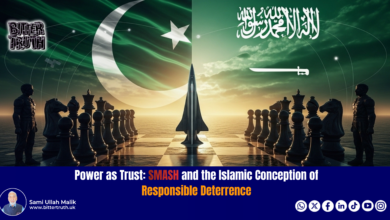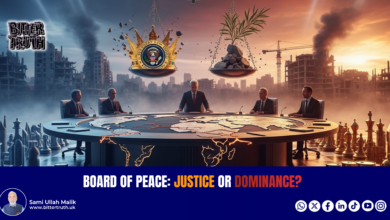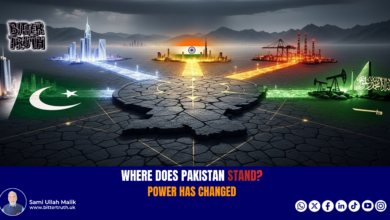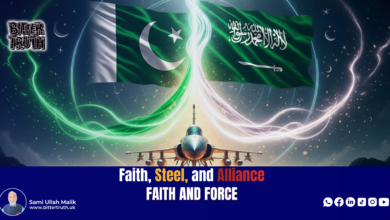America’s Moral Standing: Changes During the Trump Era
American Values and the Trump Era: A Critical Review
This was the first time that an American president, sitting in the White House with full control over the nuclear briefcase, had his mental health questioned openly on American electronic media. A prominent psychologist, with evidence, publicly expressed concerns regarding Trump’s mental stability, sending a wave of alarm through defence and political analysts alike. The psychologist argued that since Trump assumed office, he had repeatedly acted in ways that seemed contrary to what had made America a great power. Time and again, his words and actions were at odds with the dignity and requirements of the office. Trump appeared intent on bringing his capricious nature into the presidential role, disregarding the principles and characteristics that had historically strengthened America. More and more Americans, they argued, were sensing the damage this approach was causing.
Predicting global politics is notoriously challenging due to the rapid shifts in circumstances that threaten any prediction’s accuracy, and Trump’s tenure was especially complex in this regard. During his first year in office, the unpredictability of his actions left analysts cautious about making predictions, knowing he might confound them by taking contrary actions. Historians examining Trump’s presidency may well note how his impulsive behaviour disrupted the discipline expected of the office. Throughout his term, Trump appeared to lack a clear vision or the ability to formulate a “grand strategy” that could offer America a structured path through crises or a refreshed model for its society and governance. His seriousness on these matters, it seemed, fell notably short.
No nation can progress, let alone survive, without a coherent and overarching strategy. For the U.S., as a global superpower, it is crucial to maintain a stable leadership structure and a well-defined strategy on international affairs. Historically, America has followed such a comprehensive approach, not out of choice but necessity. The United States, being a superpower, must cultivate strategic alliances worldwide and maintain oversight across regions. A president cannot simply ignore or act contrary to the grand strategy of the country. Even if a leader lacks insight, they must nevertheless take an active interest in strategic matters. While Trump may not seem to possess the required vision, he too cannot disregard the grand strategy. As Leon Trotsky aptly noted, if a leader shows no interest in grand strategy, it will inevitably affect them, leaving only the option to advance.
Trump assumed office at a critical juncture. For the preceding seventy years since World War II, America had positioned itself as a global leader capable of reshaping the world. The U.S. has influenced various regions according to its interests, fostering development in some areas while bringing destruction to others. After the Cold War ended in 1990, America emerged as the sole superpower with increased responsibilities. Over the subsequent thirty years, the U.S. has achieved some positive outcomes but more frequently has been entangled in turmoil. Often, American actions seemed either poorly planned or driven by fear.
According to American defence analysts, it is significant that Trump was elected president at a time when China had fully emerged as a formidable global power. China now presents a substantial challenge to U.S. military and economic dominance, necessitating a shift in the American grand strategy. Furthermore, in the region, Pakistan—once a vital ally that played a crucial role in establishing America’s superpower status—now faces strained relations with the U.S. due to the ongoing human rights abuses in Kashmir and terrorism issues linked to India.
The U.S.’s failed policy of pressuring Pakistan while strengthening ties with India, compounded by the disastrous withdrawal from Afghanistan, has backfired. In response, a robust regional alliance comprising China, Pakistan, Russia, and Iran has emerged, creating a new power bloc that could challenge U.S. influence in the area.
On one hand, China has emerged as a significant challenge to the military and economic dominance of the United States, and on the other, the rapidly changing situation in the Middle East is also causing issues for the US. It should be noted that there is a growing trend worldwide of rejecting democracy as an ideal form of governance. Many people are beginning to question whether democracy is even necessary if authoritarianism can effectively solve their problems.
For decades, the United States has maintained an uncontested dominance over global politics and economics, making decisions in alignment with Europe and reaping the benefits. However, much has now changed. Several nations have rapidly emerged as powerful forces. Europe, to a great extent, has charted its own course, while China, Russia, Brazil, South Africa, and many other countries have grown stronger. Their stability has surfaced as an evident threat to American supremacy.
Even within the United States, there are now questions regarding America’s role in global politics and economics. The most critical question in the current presidential election is how to enable America to retain its dominant status on the world stage. Clearly, challenges have increased, and exceptional changes in strategy are inevitable. During his tenure, Trump did little to indicate that he possesses the ability to elevate America to new heights. He appears to lack the political insight deemed essential for an American president. However, this does not mean that he has failed entirely to leave an impression. In some areas, he has demonstrated a degree of moderation beyond his usual rhetoric, and to some extent, has influenced American thought through his words and actions.
Many Americans now feel that Trump’s efforts have affected the principles and methods that have maintained the country’s dominance in global politics and economics. Trump claims that his ideas and actions will bring unprecedented strength and wealth to America, sustaining its supremacy on the global stage. However, his policies have actually caused harm to the nation. Policymakers are increasingly aware that since Trump’s arrival, America’s position as the leading global power has weakened. The impact of Trump’s words has not matched their expected outcome, and Americans are beginning to see that his policies may have limited America’s influence on the world stage.
Some American policymakers claim, debatably, that for four generations, the US has provided a system to the world that has paved the way for peace, prosperity, stability, and democracy. This is stated in comparison to other political systems. America’s dominance in global politics and economics has been largely a result of its “hard power.” The country wielded unmatched strength and focused intensely on utilising this power effectively.
Following World War II, America formally assumed the role of a global power. While it did not enjoy uncontested dominance during the Cold War due to the presence of the Soviet Union, the world was divided between two clear global powers. America exerted substantial military influence globally, especially after the end of the Cold War, which further bolstered its military power. Its share in the global economy expanded to the point where at one stage, its gross domestic product comprised 25% of the global GDP. The world had never seen a single nation as powerful as America.
This dominant position, however, would not have been possible if the Soviet Union had not made the error of invading Afghanistan and without the extensive support of allies like Pakistan, who significantly assisted America in becoming the world’s sole superpower. However, after achieving its objectives, America repeated its historical pattern by abandoning Pakistan and Afghanistan mid-crisis. It immediately gravitated toward an alliance with Pakistan’s adversary, India, who, after five decades of loyalty to Russia, turned towards America, a shift that was openly criticised by Russia’s Ministry of Foreign Affairs.
Yet, in a twist of fate, the principle of “actions have consequences” has, within recent years, created numerous threats to American supremacy. Now, China, Russia, and other nations have emerged as formidable rivals. Nevertheless, America believes that its military and economic power still provides substantial influence over global politics and economics, and that its leadership remains capable of significantly impacting worldwide affairs.
At the close of World War II, America could have devised a strategy solely beneficial to itself, strengthening its military and economic power to its fullest extent. However, policymakers focused on creating an international system that not only ensured America’s own stability but also fostered the development, prosperity, and progress of like-minded countries. Institutions were established, and programmes were organised to maintain this international order, positioning America as a global leader.
America established military alliances and worked to secure international trade routes as a means to maintain global peace. But the underlying intent was to create a world order in which America could thrive and maintain its own stability and progress with greater ease.
After World War II, the United States could have devised a strategy that benefited both itself and its close allies, allowing it to further consolidate its military and economic power. Instead, policymakers focused on establishing an international system through which the U.S. could achieve stability and ensure the economic prosperity of its allies, especially those inclined to support its agenda. In particular, this meant winning the allegiance of countries willing to back its initiatives, much like its allies have done in supporting U.S. actions in the Middle East and Afghanistan. To sustain this international order, various institutions and programmes were developed, positioning the U.S. as a global leader. The U.S. also formed military alliances and sought to secure international trade routes, ostensibly in the name of global peace, though ultimately to create a world where it could thrive with ease.
The post-WWII American efforts to reshape the world according to its design had one primary goal: establishing dominance in global politics and economics without facing significant challenges. The “New World Order” programme, introduced by George H.W. Bush and inspired by Henry Kissinger, sought to establish a framework that would solidify U.S. power in economics, military strength, and diplomacy. The purpose was to create a world order where the U.S. could wield its influence on a scale that could bolster its global leadership by controlling the economy to serve American interests.
It’s important to note that, while the U.S. has made far-reaching decisions in global politics and economics, it has not always resorted to heavy-handed tactics against its allies. Rather than enforcing its will through direct power, the U.S. often employed a subtler approach, sharing portions of the benefits with countries willing to accept its global vision. Unlike other superpowers, the U.S. has been less inclined to impose its will forcefully, and many of its partners have openly admitted that they are more afraid of the U.S. stepping back from global affairs, potentially exposing them to competition from other powers.
The “America First” slogan has consistently underscored American politics and economics. The U.S. has always prioritised its interests, aiming to bend situations to its benefit rather than adapt to them. A European diplomat once remarked that for seventy years, Europe danced to America’s tune. From Vietnam to Nicaragua, people have witnessed the lengths to which U.S. officials have gone to secure their national interests, often embracing harsh policies without hesitation. Beyond economics and politics, America’s leadership approach has also been significant in areas such as global peace and stability. Since World War II, the U.S. has played an extraordinary role in promoting peace and stability, especially when the world was divided between capitalism and communism. America’s allies believed that it had the commitment and capability to deliver on its promises and that it alone could achieve stability in a dangerous world.
American presidents have persistently strived to ensure that democracy and human rights flourish globally, particularly in alignment with U.S. interests—a sentiment reflected in the ousting of Algeria’s and later Egypt’s Morsi government. The U.S. leadership believes that its global standing is bolstered by upholding certain moral standards worldwide, advocating open societies and the spread of liberalism. Former U.S. Secretary of State George Shultz once said that the most stable relations were with countries whose democratic roots were aligned with U.S. policies. This isn’t coincidental; the U.S. gravitates towards countries with democratic and secular values similar to its own, fostering closer political and economic ties with nations whose political traditions are aligned with those of the U.S. and its allies.
The U.S. has not solely relied on “hard power” (economic and military might) to assert itself. To sustain its global influence, it has employed “soft power” to shape perceptions worldwide. American leaders have always wanted their country to be seen not just as a force to be feared but as one to be admired. While anti-U.S. sentiment is widespread, people globally still dream of opportunities in the U.S. Even in countries where citizens harbour deep resentment toward the U.S., there remains an eagerness to secure a U.S. visa. The “soft power” of the U.S. has played a vital role in enhancing its “hard power,” creating an allure that continues to draw people despite any reservations they may hold. Unfortunately, the immigration policies under Trump have tarnished this image, to the point where even the U.S. Supreme Court intervened, rejecting parts of Trump’s policy and reflecting the broader impact it has had on America’s longstanding appeal.
Thus far, Donald Trump’s statements indicate that he is more focused on destruction than on creation. (For Dean Acheson, it was significant that he was present at the time of America’s creation.) According to American and Western political analysts, one can assert without fear of contradiction that, looking at Trump’s bombastic statements, he might one day take pride in having been present during America’s downfall. During his election campaign, Trump said much that suggests he has little regard for upholding fundamental American values. He prioritised his interests over free trade, insisting that the latter be set aside.
Trump has not demonstrated the kind of appreciation for democracy that his predecessors have shown. Most notably, he expressed admiration for Vladimir Putin, who views authoritarianism as a fundamental political value and seeks to centralise all power in himself. Trump seems intent on dismantling what the US has achieved over five to six decades. He believes that the post-war foreign policy adopted by America has granted opponents such considerable concessions that they are now contemplating retribution. The United States has indeed attempted to shape the global economy according to its own interests in the world following the Second World War, but in doing so, it has also shared its products and technologies with the world. This is something individuals like Trump disapprove of; they believe that America should refrain from spreading its technologies and advanced products globally.
By allowing the US military to employ torture on prisoners, Trump has stated that if it becomes necessary to commit war crimes in the fight against terrorism, there is nothing wrong with that. This indicates that America has managed to maintain its dominance in some manner, but Trump has been eager to dismantle it. It is not the case that Trump’s presidential remarks are merely emotional. He has long been highly critical of several American partners. In the 1980s, he targeted Japan and Kuwait, asserting that the US received little from both countries while giving much. Similarly, he harshly critiqued Germany and Mexico in 2015 and 2016, stating that both had played a parasitic role in relation to the US. The views he expressed about some of America’s partners during his campaign reflect his perspectives from the past two or three decades. This means that what Trump has said about certain allies as president is not merely bluster or emotional rhetoric; he genuinely wishes to take action. In fact, he seems eager to push some of America’s allies aside and establish new relationships, regardless of the heavy price the US may have to pay.
Will the well-wishers of the US and its allies once again support Trump’s policies, which are leading America rapidly towards isolation?






